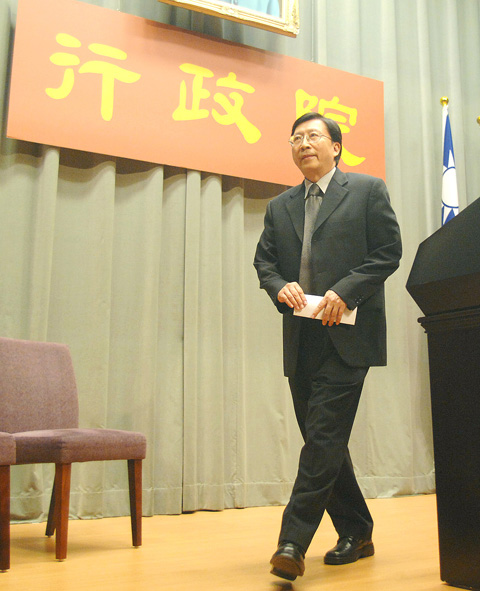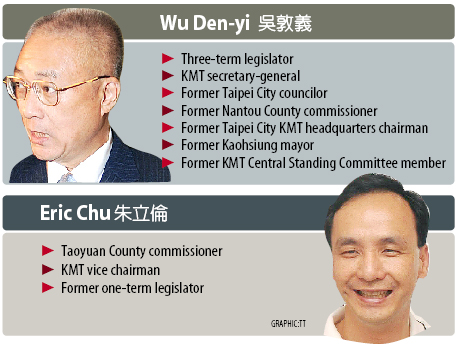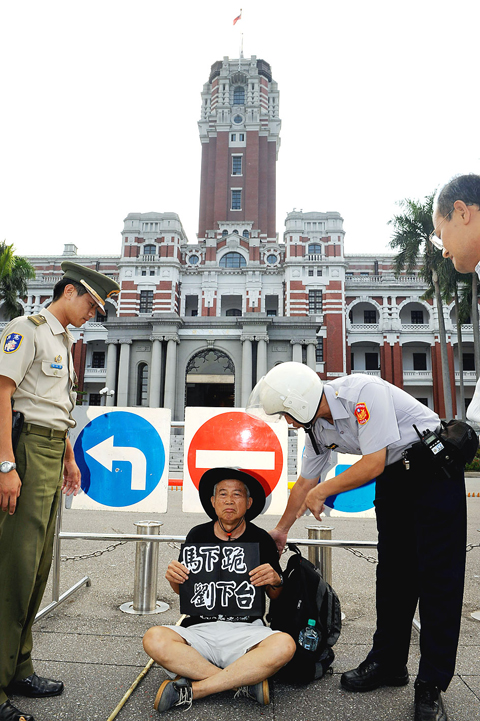Premier Liu Chao-shiuan (劉兆玄) took everyone by surprise yesterday afternoon by announcing that President Ma Ying-jeou (馬英九) had accepted his resignation.
Liu will lead the Cabinet in resigning during the Executive Yuan’s weekly meeting on Thursday, Liu told a 4:30pm press conference.
Shortly after his announcement, the Presidential Office said Chinese Nationalist Party (KMT) Secretary-General and Vice Chairman Wu Den-yih (吳敦義) would replace Liu, while Taoyuan County Commissioner and KMT Vice Chairman Eric Chu (朱立倫) would become vice premier.

PHOTO: PATRICK LIN, AFP
“So many people died [in the aftermath of Typhoon Morakot]. I believe someone should shoulder the political responsibility,” Liu said.
“As premier, I should take full responsibility, so I tendered my resignation in the middle of August,” he said.
Liu said Ma wanted him to stay on, but he was determined to step down, adding that he had only agreed to stay on temporarily to preside over the beginning of reconstruction work.

Liu said that between 80 percent and 90 percent of Morakot victims had received stipends from the government, while 92 percent had been temporarily relocated to military camps or government dormitories.
The legislature also passed the Post-Typhoon Morakot Reconstruction Special Act (莫拉克颱風災後重建特別條例) and the Executive Yuan has submitted the related budget request to the legislature, Liu said.
“I have completed my mission for now. It’s time for me to leave,” Liu said.

PHOTO: CHU PEI-HSIUNG, TAIPEI TIMES
“As the highest-ranking government official in the nation, I should shoulder all political responsibility, so I tendered my resignation again. The president finally approved it,” he said.
Ma had supported him and they discussed the matter until late last night, he said.
Liu also apologized to Ma and the public for the performance of the Executive Yuan during the disaster.
“Many things should have been done better,” he said.
He thanked Ma, Cabinet officials, the various civic groups involved in disaster relief efforts and religious leaders.
“God bless the Republic of China. God bless the Taiwanese people,” Liu said.
Speaking shortly after Liu’s press conference, Presidential Office Spokesman Wang Yu-chi (王郁琦) said Ma met Liu on Sunday night and thanked him for his contributions over the past year.
The president also told Wu and Chu that they did not have the choice of rejecting the offer to serve the nation at such a critical time, Wang said.
Ma would finalize the new Cabinet with Wu “in a few days,” Wang said.
Wang said Ma and Liu had agreed last month that Liu would take responsibility for the disaster early this month and that Liu again offered to resign on Saturday after he returned from Kaohsiung, where he had been staying with some Cabinet officials to gain first-hand information on the disaster situation and relief work.
Ma began to ask about Wu’s interest in the premiership last Thursday and Chu’s interest in the vice premiership on Friday, Wang said, adding that the final decision was the president’s alone. Asked whether their appointments were related to the year-end elections, Wang said both men were chosen for their abilities and extensive political experience.
Chu’s term as county commisser was scheduled to end in December, Wang said, while Wu has served as Nantou County commissioner and Kaohsiung mayor.
Wang also praised Wu’s experience in party and administrative affairs, adding that Wu and Ma were “old friends” who understood each other very well.
Chu was an outstanding young talent, Wang said.
Faced with such a “tough task,” Wu told reporters that he hoped to continue the work of Liu’s team to improve the economy. He also said he would step down from his two KMT posts.
The Democratic Progressive Party (DPP) caucus praised Liu and his Cabinet for resigning, but expressed surprise at Wu’s appointment.
DPP lawmakers, who watched the Presidential Office’s announcement of Wu’s appointment on TV, lauded Liu’s resignation and said Ma was truly one of the world’s “gutsiest” leaders, as he has been described by the US satirical magazine, mental_floss.
“It was a day full of surprises,” the lawmakers said.
DPP Legislator Chai Trong-rong (蔡同榮) said Liu resigned because he had listened to the public, adding that he hoped the new Cabinet would be more efficient.
DPP Legislator Huang Wei-cher (黃偉哲) gave Liu credit for taking political responsibility and stepping down.
Liu’s resignation was in line with public opinion because many people were dissatisfied with the Cabinet’s performance, Huang said.
DPP Legislator Chen Ting-fei (陳亭妃), however, said Liu should have resigned earlier, adding that Ma had only approved Liu’s resignation because public feeling was so overwhelming.
The DPP caucus slammed Wu’s nomination as “unacceptable.”
KMT Legislator Lo Shu-lei (羅淑蕾) also lauded Liu for stepping down and gave Wu her best wishes.
Asked if she had any reservations about Wu’s ability to be premier, Lo said: “Ask other members [of the KMT caucus] and you will see.”
She did not elaborate.
Meanwhile, Ma was heckled by a typhoon victim in Pingtung County yesterday. The woman asked that Ma step down if Liu refused to resign to take responsibility for the government’s slow response to Morakot.
Chanting “This man should step down” and holding a banner that read “Why not come for a long stay?” the woman said the government’s relief efforts had embarrassed the country.
“He [Ma] is staying in an air-conditioned room. He should come down here to see things for himself,” she said. “They clean the streets before he comes, but it is superficial.”
The government held a national memorial service for typhoon victims in Kaohsiung yesterday, but one survivor said he could not attend because there was no transportation.
Another woman said she could not go because the engine of her car was gone.
In related news, former president Lee Teng-hui (李登輝) said in Japan yesterday that many Japanese friends had given him donations for Morakot victims because they didn’t know how or where to send the money.
Meanwhile, representative to Japan John Feng (馮寄台) declined to comment yesterday on why he was in Europe at the height of the disaster.

SECURITY: As China is ‘reshaping’ Hong Kong’s population, Taiwan must raise the eligibility threshold for applications from Hong Kongers, Chiu Chui-cheng said When Hong Kong and Macau citizens apply for residency in Taiwan, it would be under a new category that includes a “national security observation period,” Mainland Affairs Council (MAC) Minister Chiu Chui-cheng (邱垂正) said yesterday. President William Lai (賴清德) on March 13 announced 17 strategies to counter China’s aggression toward Taiwan, including incorporating national security considerations into the review process for residency applications from Hong Kong and Macau citizens. The situation in Hong Kong is constantly changing, Chiu said to media yesterday on the sidelines of the Taipei Technology Run hosted by the Taipei Neihu Technology Park Development Association. With

CARROT AND STICK: While unrelenting in its military threats, China attracted nearly 40,000 Taiwanese to over 400 business events last year Nearly 40,000 Taiwanese last year joined industry events in China, such as conferences and trade fairs, supported by the Chinese government, a study showed yesterday, as Beijing ramps up a charm offensive toward Taipei alongside military pressure. China has long taken a carrot-and-stick approach to Taiwan, threatening it with the prospect of military action while reaching out to those it believes are amenable to Beijing’s point of view. Taiwanese security officials are wary of what they see as Beijing’s influence campaigns to sway public opinion after Taipei and Beijing gradually resumed travel links halted by the COVID-19 pandemic, but the scale of

A US Marine Corps regiment equipped with Naval Strike Missiles (NSM) is set to participate in the upcoming Balikatan 25 exercise in the Luzon Strait, marking the system’s first-ever deployment in the Philippines. US and Philippine officials have separately confirmed that the Navy Marine Expeditionary Ship Interdiction System (NMESIS) — the mobile launch platform for the Naval Strike Missile — would take part in the joint exercise. The missiles are being deployed to “a strategic first island chain chokepoint” in the waters between Taiwan proper and the Philippines, US-based Naval News reported. “The Luzon Strait and Bashi Channel represent a critical access

Pope Francis is be laid to rest on Saturday after lying in state for three days in St Peter’s Basilica, where the faithful are expected to flock to pay their respects to history’s first Latin American pontiff. The cardinals met yesterday in the Vatican’s synod hall to chart the next steps before a conclave begins to choose Francis’ successor, as condolences poured in from around the world. According to current norms, the conclave must begin between May 5 and 10. The cardinals set the funeral for Saturday at 10am in St Peter’s Square, to be celebrated by the dean of the College